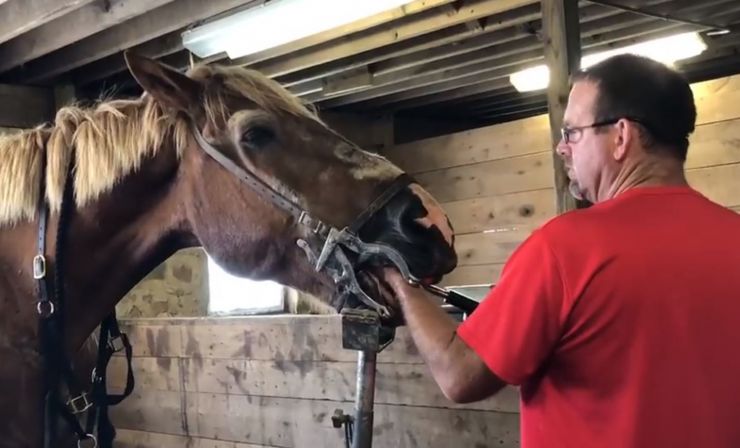
For nutrition and bit comfort
Your horse’s teeth change dramatically as he ages. He’ll naturally add and lose teeth; and the teeth he keeps will change. The wear and tear from eating and work will regularly present as sharp edges and overgrowths that cause serious pain. If left untreated, these lead to nutritional intake issues, uncooperative work attitude, colic, and choke. Annual dental exams and periodic dentistry will keep him healthy.
Dentistry performed by a licensed veterinarian is critical to your equine’s health. Because equines live much longer than they used to, dentistry has evolved from being a form of simple farm animal husbandry to a veterinary medical service.
Dr. Jay loves to do teeth! Clients usually don't understand why (it’s hard work, it is very physical, often in very hot or very cold weather, horses can be uncooperative), but he still loves it after 10 years. Here's what Dr. Jay says about teeth.
“Teeth are amazing! I bet improved dental health has singularly advanced horse longevity more than anything in the last decade. The mouth is so important and there is much, much more than just rasping a few sharp points. When I can attend to a horse for many years, it will live a longer and healthier life. This direct contribution motivates me, and inspires me. And I do love physical work, in hot or cold weather, anywhere."
Equine dentistry is extremely important for your horse.
Horses will process and digest food more efficiently when their teeth are properly maintained. As your horse grinds his/her food up, the teeth grind together. This daily grinding action is what causes your horse’s molars to develop very sharp edges. This causes discomfort when a bit or halter pushes the cheek against the sharp tooth. When your horse chews, and he/she has sharp molar edges, their cheek and tongue can get lacerated from the chewing action with the sharp edges. Also, if the sharp edges are not corrected in a timely fashion they can cause a slab tooth fracture where your horse’s tooth breaks and will eventually need to have that tooth extracted. Uneven wear on teeth can also cause your horse’s teeth to work themselves loose. These are a few reasons why it is very important to have your horse’s teeth examined by a veterinarian.
Listed below are some signs that your horse may be experiencing dental issues:
- Dropping feed from his mouth while eating
- Quidding, or dropping partially chewed hay balls
- Having difficulty chewing
- Eating slowly
- Eating with a head tilt
- Loss of body condition
- Trouble maintaining weight
- A “hard keeper”
- Large or undigested food particles in manure – like long hay stems or whole, uncracked grain
- Bit issues or performance issues:
- head tilting or tossing
- bit chewing
- tongue lolling
- fighting the bit
- resisting the bridle
- Swollen jaw/face
- Nasal discharge
- Choke - one-time or reoccurring
- Life-threatening colic (as a result of impaction of unchewed food in the intestines)
We have learned that the mouth is much more complicated than previously imagined. So the simple rasping of sharp points is no longer the main issue. The overall process includes having your horse examined (temperature, listen to the heart) and mildly sedated and placing the horse’s mouth into a speculum. This allows your equine veterinary dentist total access to your horse’s mouth. Sedation allows the horse’s head to be placed in an elevated head stand to help get a better view of what is going on in your horse’s mouth. Sharp molar edges, abscesses, bit misalignments, cracked molars, slab fractures, wolf teeth, retained caps, deciduous teeth, long incisors, hooks, ramps, waves, gum inflammation, and periodontal pockets are some of the issues. It's much more than a layman's "float."
Frequently Asked Questions
What does it mean to “float” a horse’s teeth?
Routine maintenance of a horse’s mouth has been historically referred to as “floating.” It is an old English carpentry term similar to the “planing of wood.” Floating generally removes sharp enamel dental points. “Occlusal equilibration” is the modern term now used to describe the smoothing of enamel points, correcting malocclusion (faulty meeting of the upper and lower teeth), balancing the dental arcades, and correcting other dental problems. “Floating,” once a simple word now represents very complex dental examinations and procedures, including managing periodontal disease and extractions.
What is the difference between traditional floating and power floating?
Traditionally, horses have had their sharp enamel points and dental crown elongations reduced with hand-held rasps (floats). These manual dental instruments have improved in quality over the past 20 years but still require a reasonable amount of manual dexterity, physical strength and “elbow grease.” Power floats are electrical, high-quality dental tools that have evolved over the past 10 years. These instruments reduce the physical effort that is required, and with expertise and caution, allow for more complete and efficient dental care.
Motorized instruments have replaced molar cutters and chisels since there is less chance of tooth damage.
Will my horse need to be sedated during a dental exam?
Usually yes. Some horses find the process of having their mouth opened and instruments placed in the oral cavity to be stressful. Why make your horse endure the process? And to do thorough dental work, sedation is often needed. If your horse did not get sedated for its dental work, it probably didn’t get a good job. For a complete oral examination and good quality corrective care, most horses benefit from a mild sedative to relieve any stress or unnecessary movement on the patient’s part.
Available 24/7/365
CALL 703.505.2320
FOR EQUINE EMERGENCY SERVICES
Office & Pharmacy Hours
Monday 8:00 AM - 4:30 PM
Tuesday 8:00 AM - 4:30 PM
Wednesday 8:00 AM - 4:30 PM
Thursday 8:00 AM - 4:30 PM
Friday 8:00 AM - 4:30 PM
Contact Us
24033 Lacey's Tavern Ct, Aldie, VA, 20105
703.505.2320
